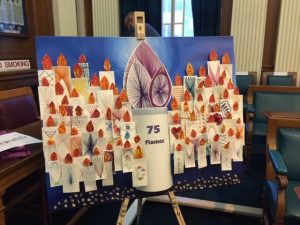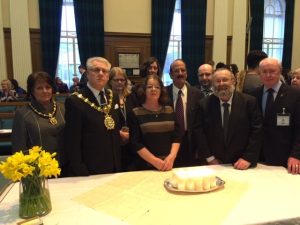Each year, on 27 January, the nation comes together to remember the Holocaust and the murder of six million Jews. This year’s ceremony also marked the 75th anniversary of the liberation of Auschwitz, the Nazis’ death camp, on the 27 January 1945. At that time, I was a four-year-old in South Wales completely unaware of the horrors that had been taking place across Europe. Similarly, young people today can be unaware of the dangers that lurk just a little below the surface of our everyday lives. Many of those who were directly affected have now died and each year there are fewer left to tell what happened. It is therefore our responsibility to make sure these memories, and the accounts of what happened at this most terrible time in the world’s history, are not forgotten.
The following are the ten recognised steps that lead to genocide:
- Classification creating an “us” and “them” mentality
- Symbolisation of the “other” such as being made to wear a yellow star
- Discrimination against certain groups
- Dehumanisation against the other as being inferior
- Organisation through state involvement to execute actions
- Polarisation between “us” and “them” through propaganda
- Preparation of armies to protect “us” from “them”
- Persecution by separation of “them” from “us”
- Extermination by mass killing
- Denial by not accepting what has been done
It is so important that we guard against this happening.
“Stand Together”, the theme of this year’s Holocaust Memorial Day (HMD), reminds me of that new commandment that Jesus gave us when he said that we are to “love one another as I have loved you”.
This simple commandment has an urgency and power that makes it an essential motivator to the way we live our lives. It challenges us in every way you can think of. We, as Christians, are called to live out these words in all we do and say, putting them into action in our day to day lives, following Jesus to build communities that stand together as Jesus wants us to be.
This is not so easy to do, we need to constantly challenge, encourage, remind and love each other in all we do and say. This being the case, how did we humans, created by God to live out our lives worshipping Him and getting rid of “self” allow such a great tragedy to happen? This is an eternal and worrying question for us as human beings. In more recent times there have been similar horrors in Cambodia, Rwanda, Bosnia and Darfur where sections of those communities were demonised by others seeking to eradicate them. Today we are conscious of anti-Semitism and Islamophobia raising their ugly heads in our own communities. Therefore, it is vital that we keep the memories from these past horrors alive and take action to live out the love of God in our world by standing together, remembering those who were murdered, supporting those in need, rising up against divisions caused by hatred, and by standing together against being drawn onto those ten slippery steps that lead to genocide.
As Jesus’ disciples there will be times when we falter and stumble. But, with Jesus beside us we will be able to pick ourselves up and be strong enough for our journey through life, by standing together in the love of God and remembering the lessons from the Holocaust.
Francis Brienen and I were privileged to be able to represent the United Reformed Church at the Holocaust Memorial Day Service held in the Central Hall, Westminster. Together with many others, we were conscious of the significance and importance of remembering and standing together. We heard from survivors and from different sections of the community representing young and older people in what was a very moving service of remembrance, an important occasion in the life of our nation and the whole world.
Let us all pledge ourselves to stand together in the love of God remembering the horror of the Holocaust and other genocides, guarding the future and living in peace and friendship as Jesus has commanded us to do in his name.
The picture below shows a coming together to light candles of peace and friendship during the HMD service in Central Hall Westminster.
 Sir Nicholas Winter who rescued 669 children from Nazis occupied Europe said: “Don’t be content in your life just to do no wrong but be prepared every day to try and do some good.”
Sir Nicholas Winter who rescued 669 children from Nazis occupied Europe said: “Don’t be content in your life just to do no wrong but be prepared every day to try and do some good.”
The two pictures below are from the local HMD remembrance held in Blackburn that I helped to organise and took part in on the 28th January along with the local mayor, leader and chief executive of the town’s council, the local member of parliament, a local rabbi, representatives of the town’s interfaith forum and young people from local schools across the town.
The collage of candles was made especially by a local art and craft group to commemorate the 75th anniversary of the liberation of Auschwitz.


Derek Estill, February 2020
